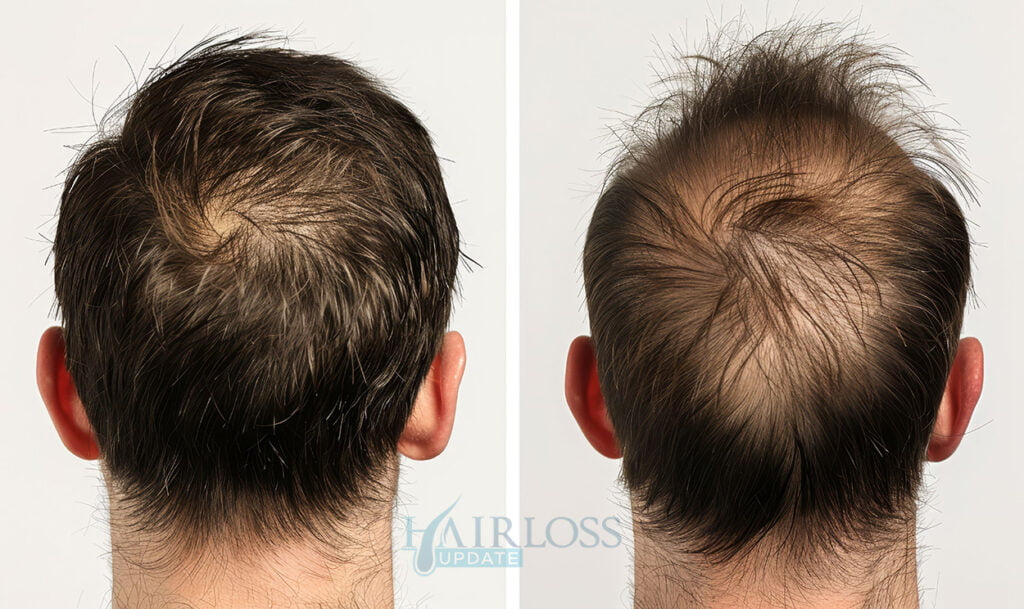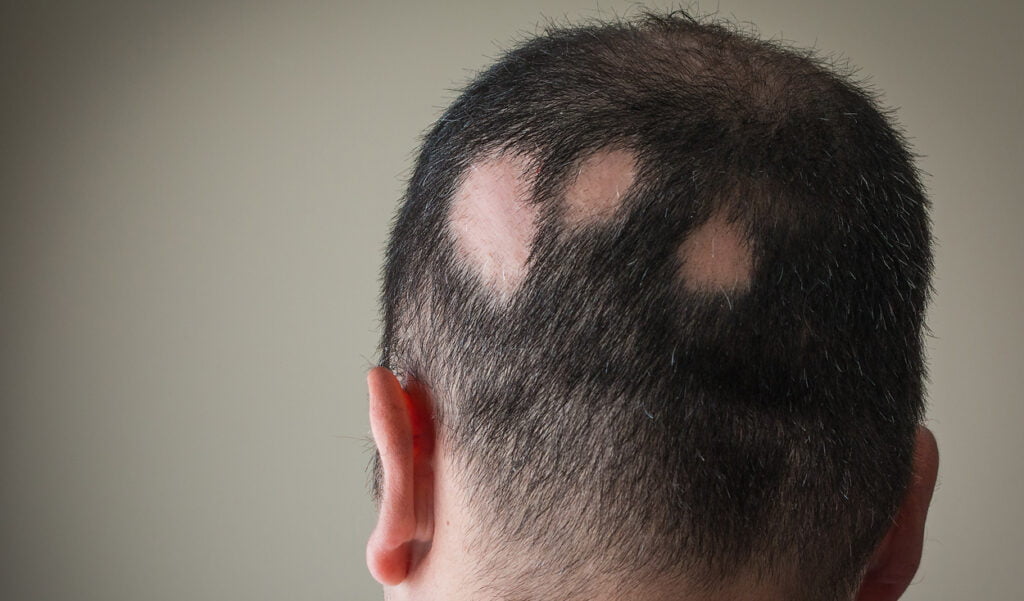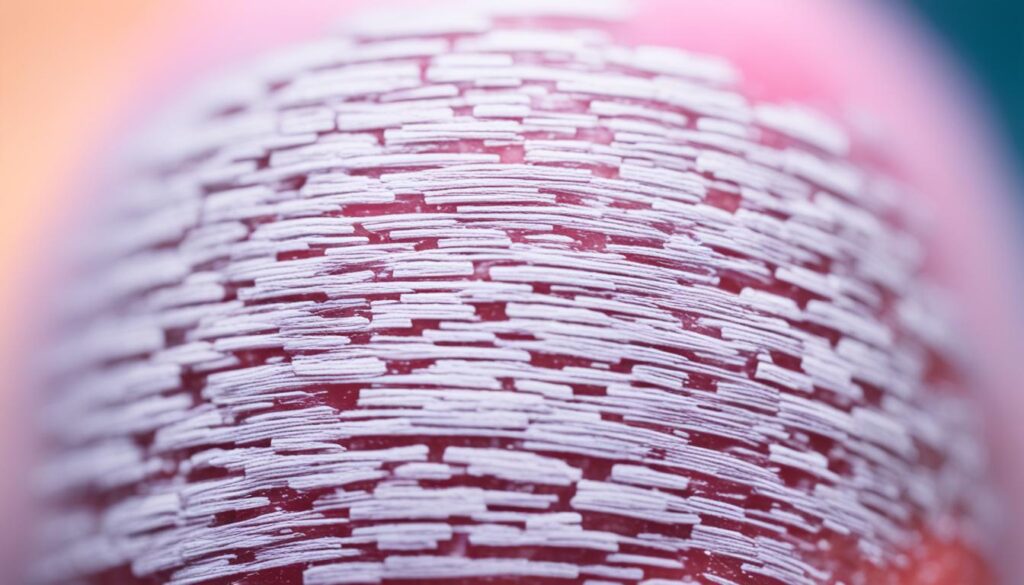Contents
Alopecia areata affects up to 7 million people in the U.S. This shows how big of an issue it is. It’s the second most common cause of hair loss. Now, there’s hope for those with severe alopecia areata, thanks to a new treatment.
The FDA approved LITFULO (ritlecitinib) on June 23, 2023. It’s the first oral treatment for severe alopecia areata in people 12 and older. Pfizer developed it. It’s a JAK inhibitor that targets JAK3 and TEC kinase and comes in a once-daily 50 mg dose.
Ritlecitinib was approved just a year after the first treatment for severe alopecia areata. This shows how fast we’re making progress. It gives hope to millions, especially the nearly 20% of people diagnosed before they turn 18.
The ALLEGRO Phase 2b/3 trial led to the FDA approval. After six months, 23% of patients had 80% or more scalp hair back. These results show how ritlecitinib could change lives for the better.

Key Points Discussed
- Ritlecitinib is FDA-approved for severe alopecia areata in patients 12 years and older
- It’s the first oral treatment option for this condition
- Developed by Pfizer, ritlecitinib is a JAK3 and TEC kinase inhibitor
- The ALLEGRO trial showed 23% of patients achieved significant hair regrowth
- Alopecia areata affects up to 7 million people in the United States
- This approval marks rapid progress in alopecia treatment options
Introduction to Alopecia Areata and Current Treatment Landscape
Alopecia areata is an autoimmune disease that affects millions worldwide. It causes hair loss on the scalp, face, and body. The immune system mistakenly attacks hair follicles, leading to patchy or complete hair loss. Let’s explore this condition and its impact on patients.
Understanding Alopecia Areata as an Autoimmune Condition
Your immune system targets healthy hair follicles in alopecia areata. This disrupts normal hair growth, resulting in sudden hair loss. The condition can range from small, circular patches to complete loss of scalp hair (alopecia totalis) or body hair (alopecia universalis).

Prevalence and Impact on Patients
Alopecia areata affects nearly 7 million people in the U.S. and 147 million globally. It can develop at any age, with 20% diagnosed before 18. The impact on patients goes beyond physical appearance, often affecting self-esteem and mental health.
Limitations of Previous Treatment Options
Previous treatments for alopecia areata had limited effectiveness, especially for severe cases. Options included:
- Topical steroids like clobetasol propionate 0.05%
- Intralesional corticosteroids such as triamcinolone acetonide
- Sensitizers like diphenylcyclopropenone
- Topical minoxidil
- Systemic treatments including oral corticosteroids and immunosuppressants
These treatments often showed variable results and came with potential side effects. The lack of FDA-approved options specifically for alopecia areata left many patients struggling to find effective solutions for their hair loss.
| Treatment | Effectiveness | Limitations |
|---|---|---|
| Topical steroids | Moderate | Limited to small patches |
| Intralesional corticosteroids | Good for localized areas | Painful, not suitable for extensive hair loss |
| Sensitizers | Effective in some severe cases | Potential skin reactions |
| Topical minoxidil | Variable results | Long-term use required |
| Systemic treatments | Potentially effective | Significant side effects |
Ritlecitinib: A Breakthrough in Alopecia Treatment
The FDA approved LITFULO (ritlecitinib) in June 2023, which is a big step forward for treating severe alopecia areata. This oral treatment gives hope to adults and teens over 12 who are losing a lot of hair.
Ritlecitinib is a JAK inhibitor that targets the immune response causing hair loss in alopecia areata. In tests, 23% of people got 80% or more scalp hair back after six months. Only 1.6% in the placebo group saw this level of improvement.

The ALLEGRO trial was a phase 2b/3 study done at 118 sites in 18 countries. It showed that ritlecitinib works well for severe alopecia areata. The trial had 718 people with a lot of scalp hair loss, proving its effectiveness.
| Aspect | Details |
|---|---|
| FDA Approval Date | June 2023 |
| Eligible Age Group | 12 years and older |
| Dosage | 50 mg once daily |
| Hair Regrowth (80% scalp coverage) | 23% of treated participants |
| Common Side Effects | Headache, diarrhea, acne, rash |
Ritlecitinib is a promising treatment, but it has some side effects. These include headache, diarrhea, acne, and rash. Patients should talk to their doctor about these risks before starting treatment.
Mechanism of Action: JAK3 and TEC Kinase Inhibition
Ritlecitinib is a game-changer in treating alopecia. It targets specific enzymes in the immune response. This new approach helps manage hair loss in a unique way.
How Ritlecitinib Works in the Body
Ritlecitinib works by blocking JAK3 and TEC kinases. It does this at a very specific level, showing its effectiveness. It also affects other enzymes, like RLK and ITK, but not as strongly.

Targeting the Root Cause of Alopecia Areata
Ritlecitinib targets JAK3 and TEC kinases to treat alopecia areata. It stops cytokine signaling and lowers T cell activity. These changes help fix hair growth cycles.
| Mechanism | Effect |
|---|---|
| JAK3 Inhibition | Blocks cytokine signaling |
| TEC Kinase Family Modulation | Reduces T cell activity |
| Combined Action | Modulates immune response affecting hair follicles |
Clinical trials show Ritlecitinib works well for people 12 and older with alopecia areata. It targets the main cause of hair loss, offering hope to those affected.
Latest FDA-Approved Hair Loss Drug: Clinical Trial Results
The ALLEGRO Phase 2b/3 clinical trial has shown promising results for ritlecitinib, the latest FDA-approved hair loss drug. This study involved 718 people with severe hair loss. It showed significant hair growth and was safe.
ALLEGRO Trial Design and Participants
The ALLEGRO trial was for people with a lot of hair loss on their scalp. It included adults and teens aged 12 and up. This shows how common hair loss is across different ages.
Efficacy Data: Hair Regrowth Outcomes
After 24 weeks of treatment, the results were amazing:
- 23% of patients taking 50 mg ritlecitinib had 80% or more scalp hair back
- Only 1.6% of patients on placebo saw the same level of hair growth
This means a big improvement in SALT scores, which measure hair loss in trials.
Safety Profile and Common Side Effects
The ALLEGRO trial showed that the drug was mostly safe:
| Side Effect | Prevalence |
|---|---|
| Headache | 10.8% |
| Diarrhea | 10% |
| Acne | 6.2% |
| Rash | 5.4% |
| Urticaria (Hives) | 4.6% |
The trial showed that the drug worked well and was safe for both teens and adults. This gives hope to many people with hair loss. It makes ritlecitinib a promising new treatment.
FDA Approval Details and Patient Eligibility
On June 23, 2023, the FDA approved ritlecitinib for severe alopecia areata. This is a big step forward in treating this condition. The drug, called LITFULO, is now available for kids as young as 12 who have this hair loss issue.
The FDA made this decision after seeing great results in the ALLEGRO trial. This trial had 718 patients from 18 countries with severe hair loss. After six months, 23% of those taking LITFULO 50 mg daily had 80% or more scalp hair back. In contrast, only 1.6% of those on a placebo saw similar results.
Now, both adults and teens aged 12 and up with severe alopecia areata can get treatment. This is great news since about 20% of those with this condition are under 18. The recommended dose is 50 mg daily, which can be taken with or without food.
- Approved for patients 12 years and older
- First FDA-approved treatment for adolescents with severe alopecia areata
- Recommended dose: 50 mg once daily
LITFULO brings new hope for many. But, it’s important to note it shouldn’t be used with certain other medications. Patients should talk to their doctor about their medical history and current meds to see if LITFULO is safe for them.
Dosage, Administration, and Treatment Considerations
Ritlecitinib is a new drug approved for alopecia areata. It needs careful dosage and administration. This section covers important points for patients and healthcare providers.
Recommended Dosage
Adults and teens should take 50 mg of Ritlecitinib once a day. This keeps the drug levels in your body steady for best results.
Treatment Monitoring
It’s key to check in with your doctor while taking Ritlecitinib. They will watch your blood counts. If your lymphocyte count goes below 500/mm3 or platelets under 50,000/mm3, you might need to pause treatment.
Drug Interactions and Precautions
Ritlecitinib can affect other drugs you’re taking. It might raise levels of certain medications. Stay away from strong CYP3A inducers. Also, avoid live vaccines while on this treatment.
| Precaution | Details |
|---|---|
| Infections | Increased risk of serious infections |
| Cardiovascular Events | Potential for major adverse cardiac events |
| Malignancy | Possible increased risk of certain cancers |
| Thrombosis | Risk of blood clots |
Talk to your doctor about your health history and medicines before starting Ritlecitinib. This helps ensure a safe and effective treatment for your alopecia areata.
Future Implications and Ongoing Research
The approval of ritlecitinib for alopecia areata is a big step forward. It opens up new areas for research into autoimmune conditions. Scientists are looking into its use for vitiligo, ulcerative colitis, and Crohn’s disease. This breakthrough marks the start of a new chapter in treating immune-related disorders.
Expanding Horizons in Autoimmune Treatment
Ritlecitinib’s success in treating alopecia areata has sparked interest in other autoimmune conditions. Researchers are testing it for vitiligo, a condition that causes skin to lose pigmentation. It could also help people with inflammatory bowel diseases like ulcerative colitis and Crohn’s disease.
Long-Term Safety and Efficacy Studies
Studies are underway to look at the long-term safety of ritlecitinib. The ALLEGRO-LT Phase 3 study is checking how it works in adults and teens with alopecia areata. This study aims to give important information on how well the drug works and its possible side effects over time.
As research goes on, scientists are hopeful about ritlecitinib’s potential. It could change how we treat autoimmune disorders. By targeting specific immune pathways, it could lead to more tailored and effective treatments. With more studies, ritlecitinib could bring new hope to those with tough autoimmune conditions.
Conclusion
Ritlecitinib, also known as LITFULO, is a big step forward in treating alopecia areata. It’s the first FDA-approved JAK inhibitor for hair growth. Studies show up to 40% of people got a lot of hair back after 36 weeks of treatment.
This breakthrough means more targeted treatments for hair loss. It’s the first oral medicine for severe alopecia areata in people 12 and older. Even though it costs about $2,500 a month, it really works for hair growth.
We’re looking forward to more progress in treating alopecia areata. With ongoing research, we might see better treatments and lower costs. Companies like Pfizer and Concert Pharmaceuticals are working on new JAK inhibitors. This could give patients more options and help fight this tough condition.
FAQs
Q: What is Ritlecitinib and how does it work?
A: Ritlecitinib is a new medication approved by the Food and Drug Administration (FDA) for the treatment of alopecia areata. It is a JAK inhibitor that helps in promoting scalp hair regrowth by targeting specific pathways involved in the autoimmune response that causes hair loss.
Q: Who can benefit from Ritlecitinib?
A: Ritlecitinib is designed to treat patients with severe alopecia areata, including both adults and older individuals with severe hair loss. It may also be of interest to men with androgenetic alopecia and women with female pattern hair loss.
Q: Has Ritlecitinib been tested in clinical trials?
A: Yes, Ritlecitinib has undergone extensive clinical trials, including studies conducted by the Yale School of Medicine. Dr. Brett King, a professor of dermatology at Yale, has been a prominent figure in these studies.
Q: When will Ritlecitinib be available for patients?
A: The FDA approved Ritlecitinib in 2024, and it is expected to become available to the public shortly thereafter. Patients should consult their dermatologist for more information on availability.
Q: Is Ritlecitinib effective for all types of alopecia?
A: While Ritlecitinib has shown promising results in treating alopecia areata, it may not work for everybody with alopecia. It is particularly effective for patients with severe alopecia areata but may also be considered for other types of alopecia under medical guidance.
Q: Are there any side effects associated with Ritlecitinib?
A: As with any new medication, there may be side effects. Patients should discuss potential risks and benefits with their healthcare provider to understand how Ritlecitinib may affect them personally.
Q: How does Ritlecitinib compare to other treatments for hair loss?
A: Ritlecitinib is a novel JAK inhibitor offering a different mechanism of action compared to existing treatments for androgenetic alopecia and female androgenetic alopecia. It provides a new option for those who have not responded to other treatments.
Q: Who should I consult for treatment with Ritlecitinib?
A: It is recommended to consult a dermatologist, preferably one with experience in treating alopecia areata. Institutions like the Yale School of Medicine have specialists in dermatology who are familiar with the latest treatments, including Ritlecitinib.
Q: Is Ritlecitinib covered by insurance?
A: Coverage for new medications like Ritlecitinib can vary by insurance provider. Patients are advised to check with their insurance company to determine if the treatment is covered under their plan.
Q: Can Ritlecitinib be used in combination with other treatments?
A: The use of Ritlecitinib in combination with other treatments should be discussed with a healthcare provider. They can provide guidance on whether it is safe and potentially beneficial to combine this medication with other therapies for treating hair loss.
Source Links
- FDA approves second Yale-researched treatment for alopecia areata – https://news.yale.edu/2023/06/26/fda-approves-second-yale-researched-treatment-alopecia-areata
- The FDA Approves Deuruxolitinib for Severe Alopecia in Adults – https://www.dermatologytimes.com/view/the-fda-approves-deuruxolitinib-for-severe-alopecia-in-adults
- An Updated Review on Current Treatment of Alopecia Areata and Newer Therapeutic Options – https://www.ncbi.nlm.nih.gov/pmc/articles/PMC10251289/
- LITFULO (ritlecitinib) FAQ – National Alopecia Areata Foundation | NAAF – https://www.naaf.org/litfulo-ritlecitinib-faq-2/
- FDA Approves Pfizer’s Ritlecitinib for Treatment of Alopecia Areata in Adolescents – https://www.pharmacytimes.com/view/fda-approves-pfizer-s-ritlecitinib-for-treatment-of-alopecia-areata-in-adolescents
- Ritlecitinib: First Approval – https://www.ncbi.nlm.nih.gov/pmc/articles/PMC10556173/
- Integrated Safety Analysis of Ritlecitinib, an Oral JAK3/TEC Family Kinase Inhibitor, for the Treatment of Alopecia Areata from the ALLEGRO Clinical Trial Program – American Journal of Clinical Dermatology – https://link.springer.com/article/10.1007/s40257-024-00846-3
- FDA Approves Pfizer’s LITFULO™ (Ritlecitinib) for Adults and Adolescents With Severe Alopecia Areata – https://www.pfizer.com/news/press-release/press-release-detail/fda-approves-pfizers-litfulotm-ritlecitinib-adults-and
- Drug Trials Snapshots: LITFULO – https://www.fda.gov/drugs/development-approval-process-drugs/drug-trials-snapshots-litfulo
- FDA Approves Deuruxolitinib for Alopecia Areata – https://www.ajmc.com/view/fda-approves-deuruxolitinib-for-alopecia-areata
- FDA-Approved Hair Loss Treatments for Androgenic Alopecia – HairScience – https://hairscience.org/news/fda-approved-hair-loss-treatment/
- Androgenetic Alopecia: Therapy Update – https://www.ncbi.nlm.nih.gov/pmc/articles/PMC10173235/
- label – https://www.accessdata.fda.gov/drugsatfda_docs/label/2022/207924s007lbl.pdf
- Alopecia Areata: An Updated Review for 2023 – https://www.ncbi.nlm.nih.gov/pmc/articles/PMC10291119/
- F.D.A. Approves Alopecia Drug That Restores Hair Growth in Many Patients (Published 2022) – https://www.nytimes.com/2022/06/13/health/alopecia-drug-approved-fda.html
- Comparing Current Therapeutic Modalities of Androgenic Alopecia: A Literature Review of Clinical Trials – https://www.ncbi.nlm.nih.gov/pmc/articles/PMC10469836/
